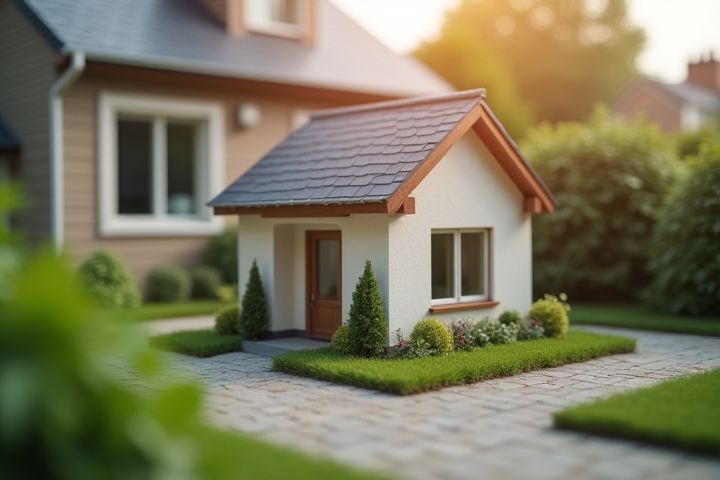
House market value is influenced by several key factors, including location, size, and condition of the property. Proximity to quality schools, shopping centers, and public transportation can enhance a home's desirability, thereby increasing its value. The overall state of the local economy, including employment rates and average income levels, also plays a significant role in determining market value. Renovations or upgrades, such as modern kitchens or energy-efficient features, can boost a home's appeal, contributing to higher prices. Finally, prevailing market trends, such as supply and demand dynamics, significantly impact how much buyers are willing to pay for homes in your area.
What Affects House Market Value
Location
Location is one of the primary determinants of house market value, significantly influencing both demand and pricing. Properties situated in high-demand areas, defined by proximity to amenities like schools, parks, and shopping centers, tend to command higher prices, often exceeding market averages by 20-30%. Neighborhood safety, quality of local schools, and access to public transportation can further enhance value, sometimes increasing it by as much as 15%. Your house's value can vary dramatically based on its zoning regulations and future development plans in the vicinity, as positive growth trends can lead to appreciation in property values.
Economic conditions
Economic conditions significantly influence house market value, with key indicators like GDP growth and employment rates serving as primary drivers. A robust economy typically leads to increased demand for housing, resulting in rising property prices; in contrast, a recession can decrease consumer confidence, lowering home values. Interest rates also play a critical role; a decrease can make mortgages more affordable, encouraging buyers, whereas higher rates may dampen home purchases. Monitoring inflation rates and wage growth is essential, as these factors directly impact buyer purchasing power and overall market stability.
Interest rates
Interest rates play a crucial role in determining house market value, as they directly influence mortgage affordability for buyers. When interest rates are low, borrowing costs decrease, enabling more individuals to secure financing and potentially driving up demand for homes. Conversely, high interest rates can deter buyers, leading to reduced demand and, consequently, a decline in property values. Understanding how fluctuations in interest rates impact buyer behavior is essential for anyone looking to navigate the housing market effectively.
Supply and demand
Supply and demand are critical factors influencing house market value, where an imbalance can lead to significant fluctuations. When demand for housing exceeds supply, prices typically rise, reflecting buyers' willingness to pay more for limited options. Conversely, an oversupply of homes in the market can drive prices down, as sellers compete to attract buyers. Key elements such as local employment rates, economic conditions, and interest rates further impact this dynamic, shaping your investment decisions in real estate.
Neighborhood amenities
Neighborhood amenities significantly impact house market value, as they enhance the overall living experience. Proximity to public parks, recreational facilities, and community centers often leads to higher property demand, reflecting positively on home prices. Access to quality schools, shopping districts, and public transport boosts the neighborhood's attractiveness, making homes in these areas more desirable. You can maximize your investment by considering neighborhoods rich in amenities, as they tend to appreciate faster than those lacking such features.
Property condition
Property condition significantly influences house market value, as potential buyers prioritize well-maintained homes. Features such as a newly updated kitchen, modern bathrooms, and a sound structural foundation can enhance desirability and market price. Neglected properties often lead to lower offers due to perceived repair costs and ongoing maintenance concerns. Investing in routine upkeep, like fresh paint, landscaping, and roof repairs, can substantially elevate your property's appeal and value in a competitive market.
Size and layout
The size of a home significantly influences its market value, with larger properties typically commanding higher prices; for instance, homes exceeding 2,500 square feet can fetch a 20% premium compared to smaller counterparts. The layout plays a crucial role, as open floor plans are often more desirable than traditional segmented spaces, enhancing perceptions of spaciousness and flow. A well-designed layout with functional room configurations can attract more buyers, leading to quicker sales and potentially higher bids. You should also consider that homes with additional bedrooms and bathrooms tend to attract families, boosting their overall market appeal and value.
School district quality
School district quality significantly influences house market value, with properties located in highly-rated districts often commanding prices that are 10% to 20% higher than those in lower-rated areas. Families prioritize access to reputable schools, which can lead to increased demand and, consequently, higher property values. Schools are often rated based on various metrics, including test scores, graduation rates, and teacher-to-student ratios, which collectively enhance neighborhood desirability. Investing in a home within a well-regarded school district not only supports your children's education but also bolsters your property's future resale value.
Local regulations
Local regulations significantly impact house market value by dictating zoning laws, building codes, and land use plans. For instance, restrictive zoning can limit development opportunities, reducing supply and potentially increasing prices for existing homes. Conversely, relaxed regulations may attract new developments, boosting housing supply and possibly lowering values. Understanding these local ordinances is crucial for buyers looking to assess the long-term potential of their investment in real estate.
Crime rate
Crime rates significantly impact house market value, influencing buyers' perceptions of safety and neighborhood desirability. Properties located in areas with high crime statistics may experience a depreciation of up to 20% compared to similar homes in low-crime regions. Lower crime rates often correlate with an increase in property values, as families and individuals prioritize security and community well-being. Ensure your investment considers local crime data to optimize your potential resale value and enhance your living experience.
